
Imagine walking into a conference or a party and you are the only one who is over dressed or look some what different from everyone in the gathering.
You can bet you will be somewhat the talk of the party and definitely you will be famous for the evening. People will want to take selfies with you, live stream the event along with you etc.
What happens with SEO
The case is quite similar. We search for keywords in similar place if not the same. Everyone is running after the same set of search engine traffic. When an idea for content strikes you, you rush to check it up Google Adwords to find out what low hanging keywords we can use. This is right! Though, I will say not too professional. But the problem is that other people are doing the same thing. Surprisingly, even your ardent competitors do the same.
However, it is interesting if you can discover a way to go about it that is hidden from others. Something that is completely unknown to your competitors. You can beat them to it. When you unravel methods that help you compete favorably with others for traffic and rankings. You have to utilize some smart ways to get keywords that have few or no competition.
I have been in search of keyword research techniques that people adopt. I have come out with 30 keyword research techniques you can use to beat your competition. These are just cool. They are quite low competition search terms.
The importance of Keyword Research
Four compelling reasons exist for undertaking keyword research as an important part of content marketing and ranking in most commonly used search engines.
Keyword research assists you to get rid of common assumptions about what you presume to be a viral topic. Most often people swiftly come to the conclusions about what is considered interesting without first investigating whether people are really searching for such terms.
It also assists you to speak the same language of search engines. Search engines are getting smarter every day, keywords are wonderful ways for them to communicate with your exciting contents and to understand what they are. They are shown when people search these terms.Keyword research help you to make your target audience visit your website. It is a wasteful effort to attract lots of traffic that are not relevant to your proposed business.
In conclusion, it helps you understand your customers better. You will have great insight when you analyze search volumes, search trends, keyword competitiveness and a lot of other parameters. This provides valuable information about how your target audience behaves.
These are the four critical reasons for keyword research. Although it may sound somewhat tedious but you will certainly reap the benefits if you do this with utter most care.
So without much ado, let us run over these 30 secret strategies of keywords searches.
List of Effective and Winning Keyword Research Methods
1. Google Related Searches
When you type in a keyword into the Google search box, a list of “Searches related to …” pops up at the page bottom.
For the keyword “best strategies for chess”

You will notice some keywords are very close to the current keyword search and some will come as low-competition long tail keywords which you can target.

2. Google Suggestions
The second we will look at is what is called Google Suggestions. This is easy and quick. You will find related keywords to the search words you are trying to target and also bring out long tail phrases. It is very simple to do. Just type into the search bar the potential word and allow the suggestions to popup below:
You can add more functionality, most especially “Wildcards (_)”, to make it very effective. Break your phrases and unveil the hidden keywords out there.

Suggestions are good when it comes to local SEO keyword investigations;

3. Google Search Console
The Webmaster’s Tools or Google Search Console can assist you to fish out the keywords your site is currently ranking for.
On the dashboard, click on “Search Traffic” and then click “Search Analytics”. On this window you can select to display data based on several parameters such as “Click Through Rate (CTR)”, “Clicks”, “Impressions” and “Position (Ranking)”.
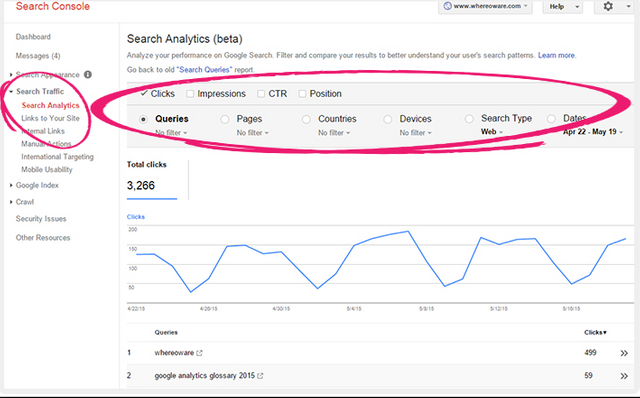
Why do you need to worry about your search traffic when we search keyword opportunities?
This valuable data is essential in planning SEO strategy and finding where you need to improve on. For instance, if you are getting much traffic from an unexpected keyword, it is quite worthwhile to pursue these topics and find long-tailed phrases to target.
If your keywords are not coming forth with enough traffic or that no one is noticing them or If the topics are essential to your business, you can turn around its performance. You may rather need to find what similar keywords you could target.
4. Adwords Keyword Planner
There are so many criticisms against this keyword research technique though, it is still somewhat worthy of consideration. It is an important part of a valuable keyword search method. The reason is that it gives an insight from Google. This is where we mostly want our content to rank.
Even if you decide to adopt other methods on this list you can validate your results, check competition for the keywords, check search volume and other important stats in Adwords Keyword Planner.
To use this, first go to the keyword planner inside your Adwords account,
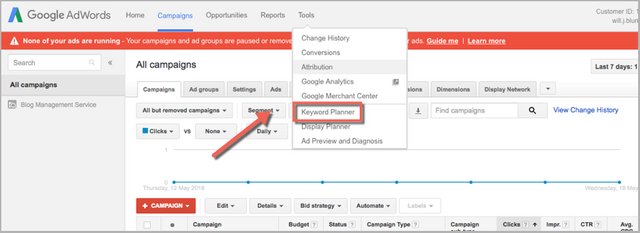
Then click on “Search for new keywords using a phrase, website or category”, input your keyword into the box at the top. You will find below what I did for “event planning”.
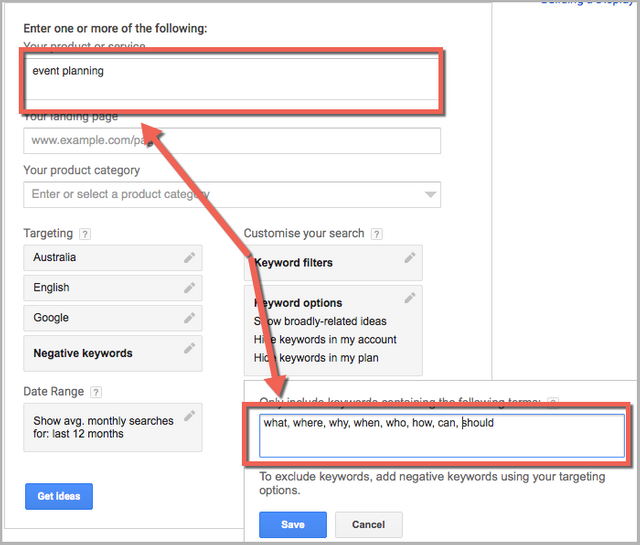
I also include in the “keywords to include” portion, the following words “what, why, where, who, when, how, should, can”. Interestingly, these are add-on word related questions. It will improve the effectiveness or the quality of the keyword suggestions that the planner will display. It will provide in addition some long tail phrases like “how to become an event planner” or “how to plan an event”.
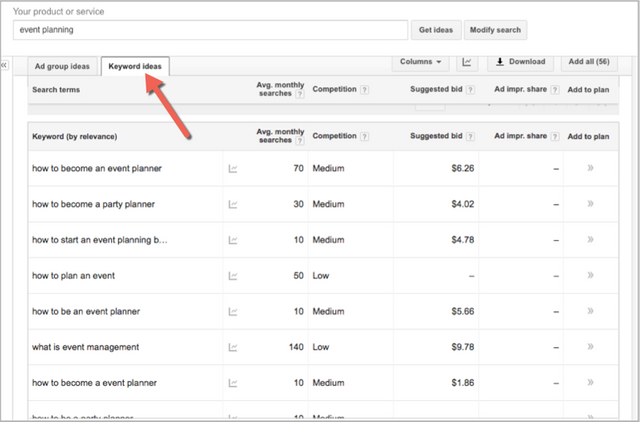
Press “Get Ideas” and then click “Keyword Ideas” to see the keyword ideas.
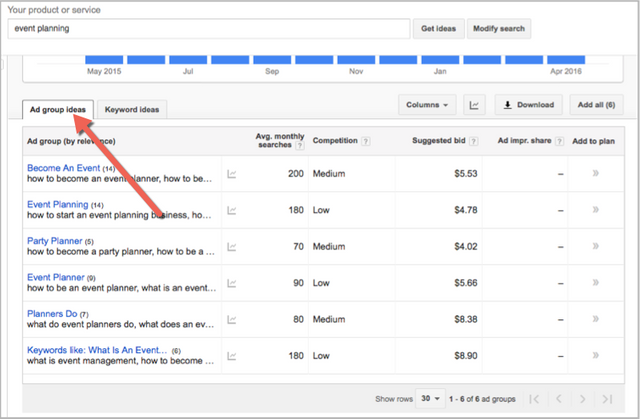
There are potential keywords usually grouped by the order of their relevance. You can click on the “Ad group ideas” tab to get this.
5. Google Trends
You will see the interest of people over a time range. This is what Google Trends show. But it’s valuable to determine whether it is worthwhile to target a keyword. Some related searches which most often do not come up in the normal search. This is a hidden treasure not known by many people.
To employ the Google Trends to get your keywords, input your search terms such as “top movies in 2017” and then move to the bottom of the same page to view the top related queries;
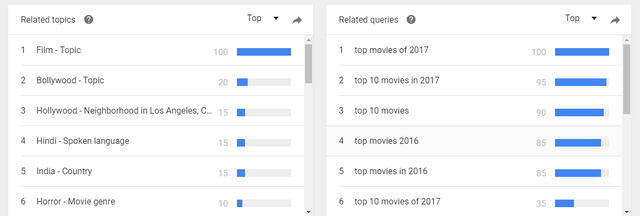
The “Rising” tab (when you click on top) will give you more insights on how each search keyword is trending. It will show whether it is on its way down or up.

6. Google Books
The Google Books is another fantastic and large index of books dated back to about 100 years. You can find some potential search terms in these books.
The process of using this technique is going to Google Books. Search out a book that will probably be a good resource for the topic or industry.
For instance, searched for “positive thinking”” and find a book titled “The Power of Positive Thinking”. You can find two keyword opportunities relating to the book title
Google book description for the related keywords that are relevant.

7. Yahoo Search and Yahoo Ads
Yahoo Search has been an exciting option. But this is often overlooked. You can input into the search bar your broad keyword term, focus on the drop down suggestions.

The same way you did with Google, you can look for further suggestions under the “Related searches” section just down the page.

And finally, you can also check for keywords in another place. Look at the side bar, there are advertisements related to your search there. This is another goldmine for similar or related keywords. Think about this. Other people who paid for this slot have made extensive keyword research.

8. Yahoo Answers
Yahoo Answers can also offer great help when it comes to keywords search. It has about 7 years’ collections of question and answer data. This will benefit you tremendously. Use the auto-fill functionality to see what is trending and what people are discussing. For instance, consider the search for “positive thinking”.

Then, review the questions for underlying interest that you can convert into long tail keywords;

In this example, most of the questions are about what an organic garden actually is, and what tools you need to get started. You can test out these phrases and questions using the Google Adwords Keyword Planner to see if people are searching for them.
9. Bing Keyword Research Tool
Although, Google controls about 93% of global search traffic and 83% of that of US, Bing can offer effective but yet hidden keyword opportunities. The interesting thing is that most of your competitors are not even aware of the existence of Bing. But this is a good news for you.
Bing Keyword Research tool functions just like the Google Adwords Keyword Planner. To use Bing, input a search term into Bing Keyword research tool and then choose a time frame. Off it goes.

It will bring out a list of suggested related keywords and the number of their appearances in user search.

You can export this result into Microsoft Excel as a CSV file and use the impressions to get out keyword opportunities you can target.
10. Udemy
This online educational community having over 30,000 online courses is not perceived by many as an excellent goldmine for keyword terms? When using Udemy to find keywords, look at the very top courses in a category in your industry.
Make a click on the browse box and let your mouse hover over different categories to see more relevant options.
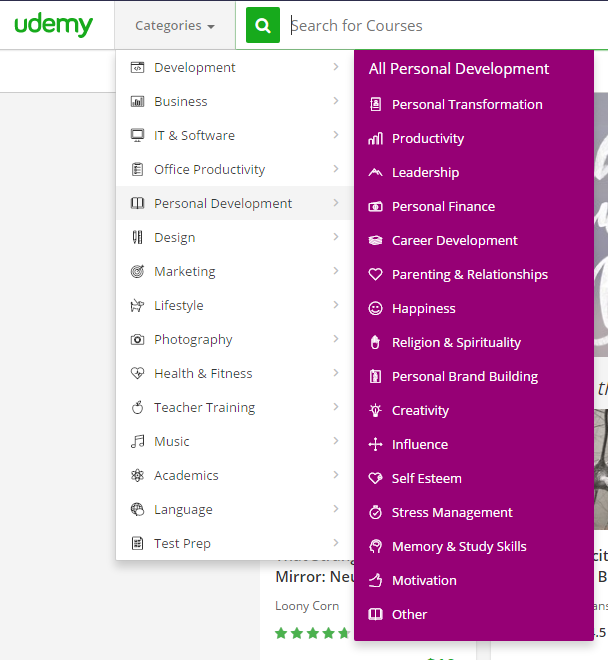
You will need to sort the search by “Popularity” to research keyword opportunities after clicking on “All Courses”.
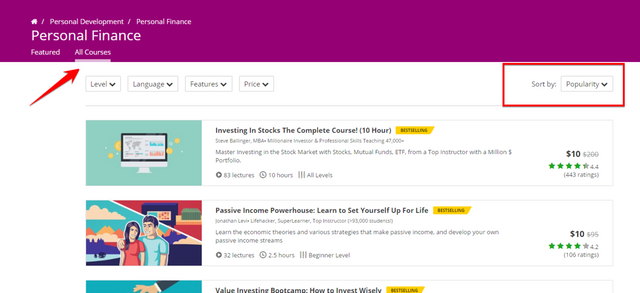
You can make this result more meaningful by filtering to thin it down to your target audience. There is on the left hand side an option to filter further by education level and price.
To get the Actual Keywords
Select the most popular courses existing in the list and then, you can commence discovering keyword ideas in the course description.
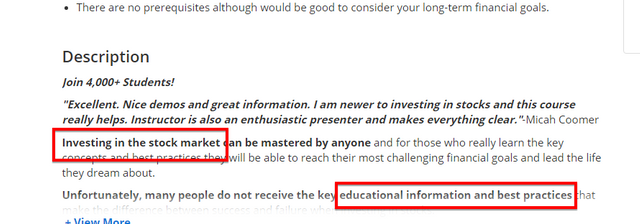
Take an interesting look at the curriculum of the course to find out any other topics of interest to your audience. You can use the topics to deepen your keywords research.
Let’s again take a look at one more important thing that may fetch you great topics and keyword opportunities. Udemy predictive search is an excellent tool to find what other students are probing or searching for just in a way similar to Google’s suggestions.

11. Ubersuggest
Ubersuggest is a powerful tool for keyword research. It works by somewhat scraping Google’s auto-fill suggestions. Make a search for the most appropriate keywords about your topic and it will give you extensions ideal for use as long tail keywords.
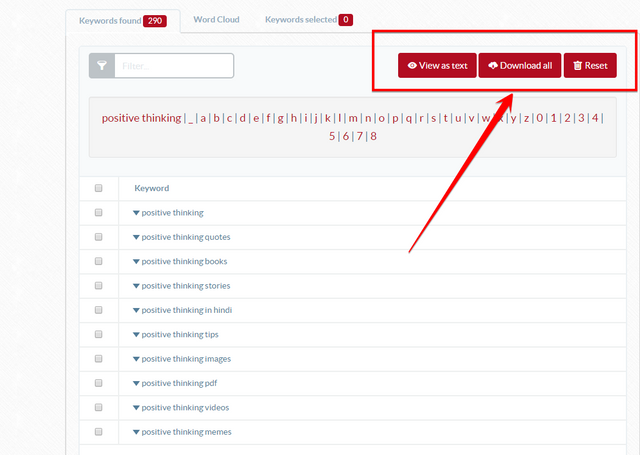
You can download this to a spreadsheet or filter these keywords or search through them in specific orders such as alphabetically.
12. Quora
Quora is another thrilling community for question-and-answer containing ever increasing members from all walks of life. Surprisingly, your customers are visiting Quora and inputting their questions for other people to resolve. These questions are helpful as they also type into Google Search similar questions.
Then how do we get out our valuable keyword opportunities. Open Quora and search for words relating to your topics. Take a look at Quora screenshot below, where this phrase “positive thinking” has been searched. Observe carefully this list of popular questions that include the phrase terms.

These questions may not ordinarily make much meaning but you can through Google AdWords keyword planner discover great potential keywords embedded in these questions.
Just take a component of these questions such as “techniques for positive thinking” and type into the keyword planner to generate new long tail keywords.
13. WebpageFX
WebpageFx let you search for keywords by scraping threads from popular forums as well as websites aggregators like Reddit. You can do this by typing in a search term and choose a category relevant to you.
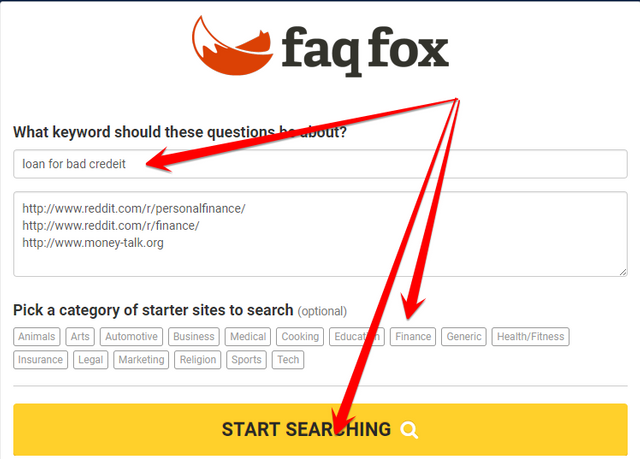
This search results will contain a list of keywords phrases that people are really seeking solutions for online. There is this great likelihood that the same language they use in the forums will be the same used in search engines like Google.

14. Soovle
Soovle amasses keywords from Wikipedia, Amazon, Ask.com, Bing, Google Suggest, YouTube and Yahoo. Type a search term into the search field to display list of suggestions as it was done for “positive thinking” screenshot below.
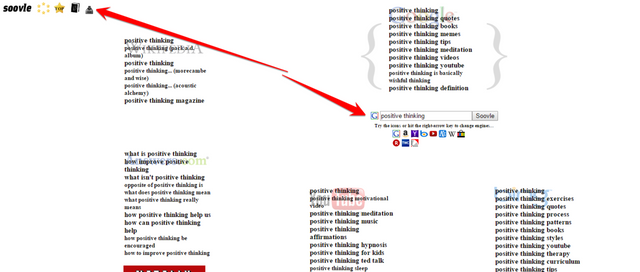
It is nice for you to export the results to CSV. This is achieved by pressing the button at the top left cornerMost often some of these useful keywords may be overlooked by your competitors.
15. Wikipedia
You can liken Wikipedia to a virtual candy store most especially for keyword opportunities. Pick up the opening paragraph of a topic that you know are of interest to your customers and then unveil the potential keywords.
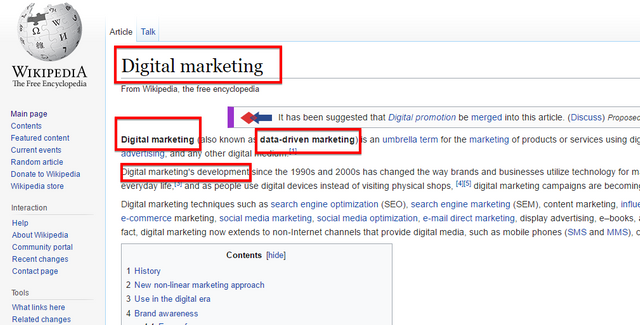
You can also take a step further. You can check out related “Categories” and “See also”. This may reveal some topics you may not have given any thought.

16. KeywordTool.io
KeywordTool.io may not be that popular but it is a good alternative to Ubersuggest that normally generates long tail keywords from Google’s Auto-complete. It uses several means to pull out from Google search suggestions on keyword popularity in search including other factors.

There are other important metrics that you stand to enjoy but most are only available if you purchase the pro. These important factors are search volume and cost-per-click.
17. Pinterest
This method has always proved effective. It is actually worthwhile. This is a wonderful part of keyword search.

You can make use of Pinterest’s Guided Search. Input your keyword into the search field and it will display some topics it correlated the search with. You can imagine how these topics can bring about new keyword opportunities.

18. Other Social Conversations
Social media is a place where trendy thing in your niche are discussed. They are your discussions, audience’s desires, needs and lots more. Simply use Twitter Advanced Search to find out what conversation is going on in your industry and most especially the topics that is of interest to your customers.

Instagram can give you the hashtag suggestions that you can make keywords from.

Or better still, search for a trendy topic on Facebook and find out about groups and pages in your industry.

And you don’t just stop there but find out the most popular posts on those pages to uncover more potential useful keywords. Check out this example on the blogging tip page.

At this stage, I am certain you get the point. Social networks are just great and full of large untapped source of keyword ideas or suggestions. Dig more and you will discover more precious virtues.
19. Amazon Products & Reviews
The same way we did with Google Books, Amazon product description reviews are fantastic spots to obtain keywords that your customers are interested in.Get the book or product your customers may be interested in.
Review the description for possible keywords opportunities. An example is found below in the case of Nicholas Kusmich’s Ultimate Guide To Using Facebook .

After this, you will do a little review mining. Go to the reviews, select few popular ones and look for common phrases, other weighty words and of course emotional triggers.

You will also find great treasures in the customer’s question and answer section on Amazon. You will certain find keywords that are relevant there.
20. Solution Comparison
There is yet this untapped valuable keyword strategy you can use to optimize the site for comparative words. You can obtain this from Google suggestions, if you already have an established market.

Although, most brands don’t consider optimizing for terms that embed their rivalry company’s name, but it is wise to capture traffic from people at the bottom of sales funnel who are ready to buy. Let’s look at the illustration of SAP page ranks #2 for “Salerforce vs SAP”.

21. YouTube
In the world today, YouTube is the second largest search engine after the internet giant, Google. YouTube processes more than 3 billion searches a month. This makes it a good repository for keyword research.
The autocomplete tool is a good point to start brainstorming ideas. The screenshot below shows the term “mobile phone” autocomplete results.

Check for the most popular video and scan the description. Occasionally, these keywords are spelt out at the bottom but you can also predict.

Look up the YouTube trends which are often made handy in Google Trends. Make the search for keyword and toggle to “YouTube Search” from “Web Search”.

22. Google Keyword Suggest Tool
This search tool will display search suggestions from Bing, Google, YouTube and Amazon. Input a keyword into the search bar and then compare the results you get from each platform.
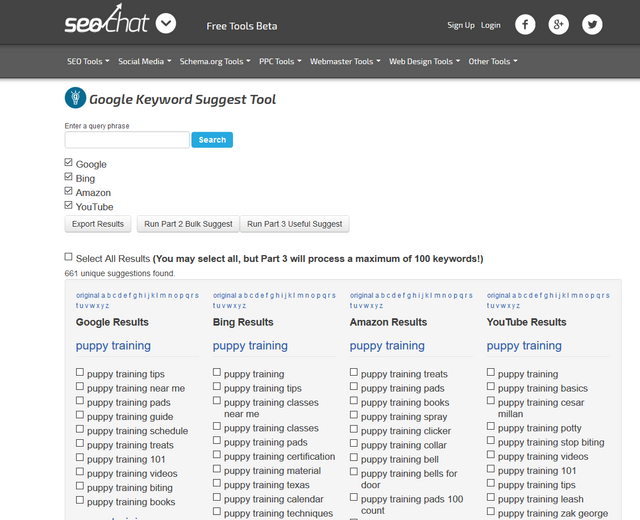
Click “Run Part 2 Bulk Suggest” having chosen some of these keywords. Watch out to see new set of suggestions that are based on your selections.
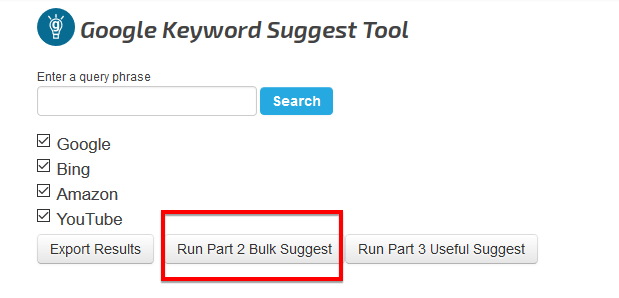
Your results can be expected or even if you prefer to dig further, click “Run Part 3 Useful Suggest”. It is a good keyword research tool. It is ideal for getting in depth keyword relationships.
23. SEMRush
SEMRush usually churn out fantastic information about keywords especially what your competitors are ranking for and essentially the keywords that are giving them the organic traffic. Let’s see the illustration below for organic search analysis of godaddy.com.

SEMRush also has a relatively new “SEO Keyword Magic” tool which is in BETA state. If you enter a primary keyword, it automatically discovers all the best terms relevant to the keyword.
If you are a registered member, you can use this powerful tool to export as a CSV great information for further analysis.
24. Moz’s Keyword Explorer
In Moz’s latest release, Rand Fishkin announced the “Keyword Explorer” on the 3rd of May 2016. The Keyword Explorer is a natural place to start great exploration of your keyword search. Enter into the search bar, a phrase or keyword and then click enter. You are instantly shown the following information about your chosen keyword – volume, difficulty, potential, opportunity, analysis, suggestions and mentions.

You can conduct additional researches by clicking “Keyword Suggestions”. You’ll be amazed to see hundreds of keyword opportunities springing out to you.
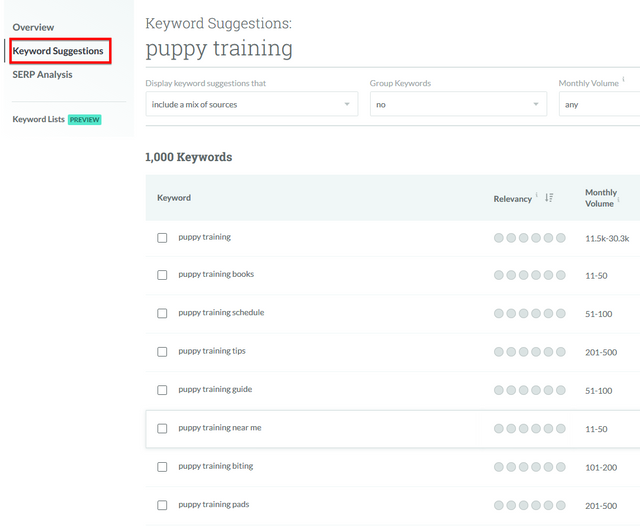
Filter these search results based on some interesting metrics that are critical to your business.
25. Answer The Public
Answer The Public is a wonderful tool. It is used to generate content ideas using some target keywords, but it can also be adopted for use in keyword research. It visualizes potential questions people may put up relating to your desired topic. Check out the illustration below:
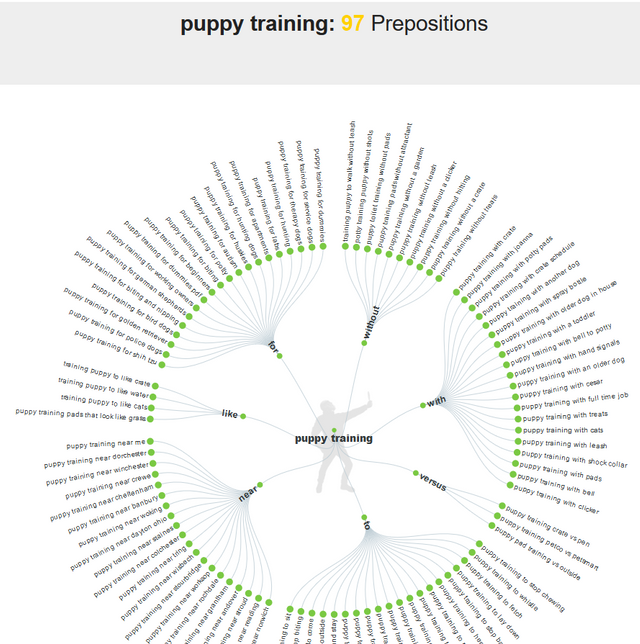
After these visualizations, there is a list of suggested keyword arranged in alphabetical order.
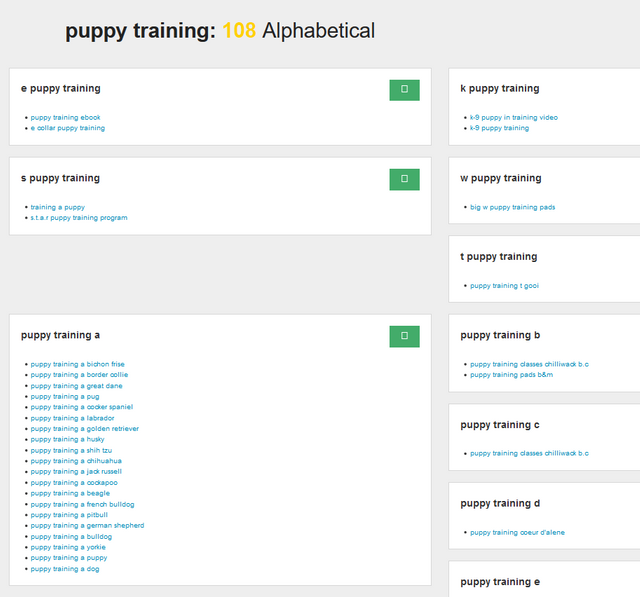
26. Seed Keywords
There are many questions that generally agitate our minds. But “What do real people search for?” is a question answered by Seed Keywords. You can search for keyword your customers in the real sense search for with this tool. You don’t have to make guesses. Seed Keywords is around to help you.
It is a straight process. You create a scenario for searches and demand your contacts to input the keywords they would use to resolve it.

From their responses you can download the data and check out to see what Google results have based on your contacts suggestions.The following is a simple illustration from their website. The scenario is “You have a faulty PC.
You want to fix it. What are you going to search for?”.
These are the results.
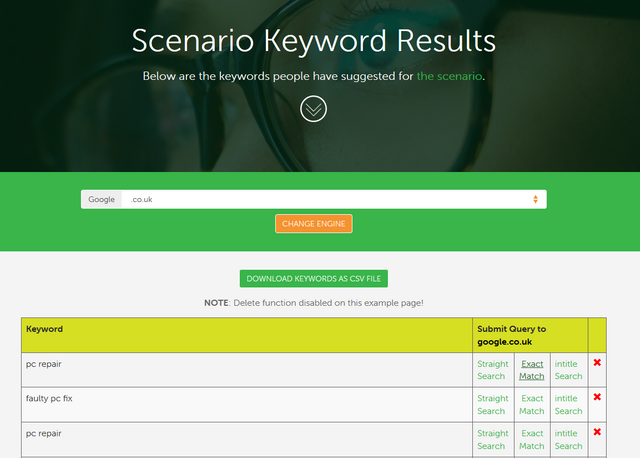
27. SEOPressor Plugin for WordPress
SEOPressor is a very useful tool for keyword search if you are a blogging using WordPress.
It makes a thorough analysis of your contents and give suggestions on how better you can optimize up to 3 keywords.
It is pretty like Yoast SEO. But it does not stop at optimization alone. This is the very reason it made it to this list.
The results contains terms closely related to your initial keyword. It is known as LSI Keywords which one can include in your web content.

28. Power Suggest Pro
Power Suggest Pro amazes keywords from about six other main search engines. Although, this is a premium tool but it’s intriguing to use when it comes to keyword search.
The major difference with others is that it permits you to include wildcards in your search. Wildcards enhance your ability to find exact terms you need.

There are also pretty specific long tail opportunities when you use this tool;And it certainly assists your brainstorming in no small measure on the search ideas.This tool also has other important functionalities such as hashtag search, geo-targeting and many more cool features.
29. SpyFu
SpyFu is good and quite interesting for analyzing keyword research method of your competitors. On the home page, you need to input a URL and it starts to do it wonderful work. There is an example of Godaddy.com.

It offers loads of valuable data like paid competitors and organic, top keywords – organic and paid, shared keywords, a breakdown of inbound links and ranking history.
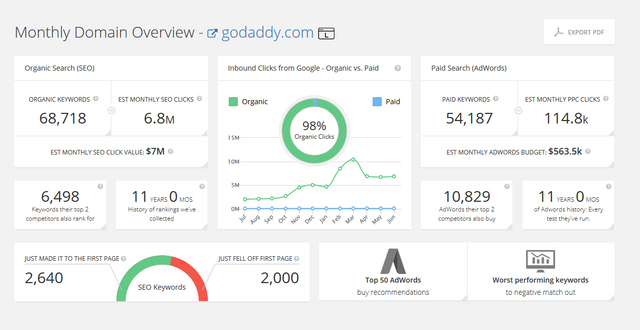
Other than that, you can simply type in a primary topic into the search bar for key research. Below is an example for the term web hosting.

There are also backlinks, SERP analysis and keyword grouping that are also available when using this tool. It displays a list of closely related keywords you can make your target.
30. Long Tail Pro
This is a preferred tool for lots of digital marketers and bloggers. The point of attraction is the availability of affiliate program. There are lots of metrics you can use in your keyword research such as Page Authority, Domain Authority and many other exciting features. You can pull out about 800 keywords per topic and receive insights into the minds of people through what they are searching for each month.
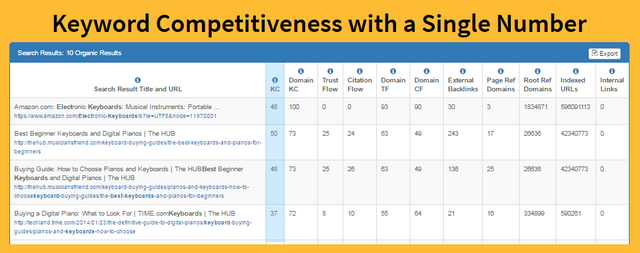
However, Long Tail Pro is interesting in that you can filter your results with a range of metrics. The most common ones are local searches, suggested bid, search volume and competition.
Conclusion
Search Engine Optimization might be frustrating.
When you find yourself stuck competing with everyone for same keywords. It can be daunting. Nevertheless, you can get yourself out of this unpleasant situation just by being a little more creative.
You combine this with left-field keyword search technique. The results will be pretty amazing especially when you discover great mine of opportunities that are available to you.
You will rank your website pretty fast and which will leave your competitors more confused than ever.
Although keyword research is time consuming, but if carefully carried out, it is exceedingly more rewarding. You can do all your keyword search all at the same time and make a six months plan on how to execute it. More so, it is not certain you will use all these methods in this write-up, you can select the ones that are more appealing to you.
Let me know if we have missed any tools or strategy.
I think you also can use your creativity and word stocks for the effective keywords. I have got so many proves that google likes keywords which are easy with use and people use thoroghly. Here, to emphasize the keyword you can use very common usable keyword synonyms to get a PERFECT KEYWORD which will definitely rank. And also you should not avoid long tail keywords in ranking terms with modifiers.
Downvoting a post can decrease pending rewards and make it less visible. Common reasons:
Submit